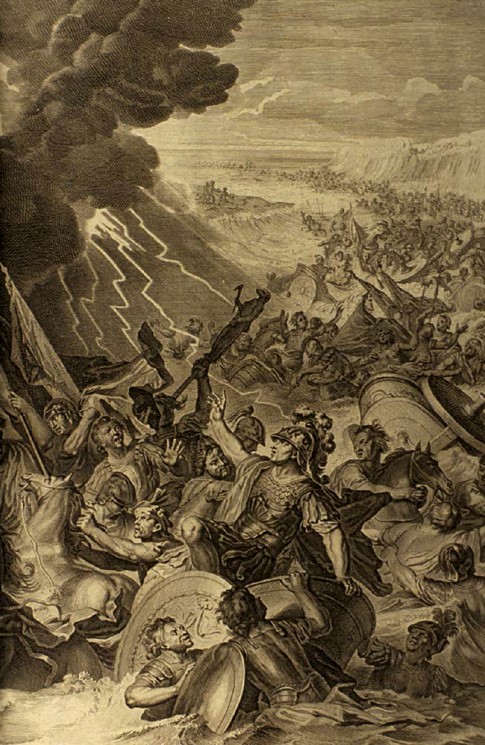THE CHARACTER OF GOD is described in many ways in the Bible. For example He is acclaimed as ‘the God of love and peace’ (2 Corinthians 13:11). These are perhaps the easiest characteristics for us to relate to. For instance, God is referred to as a ‘man of war’ on more than one occasion in the Bible!
A significant challenge for all those who wish to know the one true God is to accept what the Bible teaches about Him, and to trust that ‘the Lord is righteous in all his ways’ (Psalm 145:17)—not just in the ways we find most comfortable.
God of Peace and War
How can the Lord be a warrior and a God of love and peace at the same time? Surely these two descriptions are mutually exclusive? The answer is that He acts like a warrior towards His enemies, but He is a God of love and peace towards His friends.
When we explore the question we discover that every time God is referred to as a warrior, it is in the context of His dealings with His chosen people, the nation of Israel. It also becomes clear that the act of war was sometimes essential for Israel. When God led them out of slavery in Egypt (as recounted in the book of Exodus) it was necessary for them to go on the offensive and conquer the peoples who were occupying the ‘promised land’; it may surprise us but this was explicitly commanded by God (see Deuteronomy 20:17). Joshua, the commander who led the conquest, reminded them: ‘You have seen all that the Lord your God has done to all these nations for your sake, for it is the Lord your God who has fought for you’ (Joshua 23:3).
As well as being essential for offence, the nation of Israel—just like every other nation that has ever existed—needed an army to defend itself from its enemies. God told them that He would fight for them and deliver them from their enemies (see Deuteronomy 20:4).
At the Red Sea
The first time we see God fighting a battle is when Israel had been miraculously delivered from slavery in Egypt. God parted the Red Sea so the Israelites could pass through it and escape the Egyptians who were chasing after them:
And in the morning watch the Lord in the pillar of fire and of cloud looked down on the Egyptian forces and threw the Egyptian forces into a panic, clogging their chariot wheels so that they drove heavily. And the Egyptians said, “Let us flee from before Israel, for the Lord fights for them against the Egyptians.” Then the Lord said to Moses, “Stretch out your hand over the sea, that the water may come back upon the Egyptians, upon their chariots, and upon their horsemen.” So Moses stretched out his hand over the sea, and the sea returned to its normal course when the morning appeared. And as the Egyptians fled into it, the Lord threw the Egyptians into the midst of the sea. The waters returned and covered the chariots and the horsemen; of all the host of Pharaoh that had followed them into the sea, not one of them remained (Exodus 14:24–28).
It’s interesting to note that the Egyptian army themselves appreciated that the Lord was fighting for the Israelites. This is also how the Lord’s people understood the miraculous deliverance which they had experienced, as they rejoiced in song:
I will sing to the Lord, for he has triumphed gloriously; the horse and his rider he has thrown into the sea. The Lord is my strength and my song, and he has become my salvation; this is my God, and I will praise him, my father’s God, and I will exalt him. The Lord is a man of war; the Lord is his name. Pharaoh’s chariots and his host he cast into the sea, and his chosen officers were sunk in the Red Sea. The floods covered them; they went down into the depths like a stone. Your right hand, O Lord, glorious in power, your right hand, O Lord, shatters the enemy. In the greatness of your majesty you overthrow your adversaries; you send out your fury; it consumes them like stubble (Exodus 15:1–7).
Is this the behaviour we would expect from a God of love and peace? The fact is, on this particular occasion the Egyptians were God’s enemies and He fought against them to save His chosen people. Had He not intervened, the Egyptians would have caught up with the Israelites and slaughtered them (see Exodus 15:9). It may not make comfortable reading, but God had revealed to Moses, in no uncertain terms, the reason for His actions:
I will harden the hearts of the Egyptians so that they shall go in after them, and I will get glory over Pharaoh and all his host, his chariots, and his horsemen. And the Egyptians shall know that I am the Lord, when I have gained glory over Pharaoh, his chariots, and his horsemen (Exodus 14:17–18).
According to the Lord Himself, drowning the Egyptian army in the Red Sea was a source of honour for Him as it was a mighty act of deliverance for His people.
Furthermore, by acting as a warrior against the Egyptians (His enemies), the Lord showed Himself to be a God of love and peace towards the Israelites (His friends).
Who Are God’s Enemies?
Other occasions in which the Lord is described as a warrior include Psalm 78:65, Zephaniah 3:17, and Isaiah 42:13: ‘The Lord goes out like a mighty man, like a man of war he stirs up his zeal; he cries out, he shouts aloud, he shows himself mighty against his foes.’ These passages demonstrate that the Lord fighting against His enemies is a consistent aspect of His character. Understandably, this conclusion invites questions such as “Does God view me as one of His enemies?” and “Will there ever be peace?”
In the New Testament we are told categorically that we are all, by nature, the enemies of God: ‘You were dead in the trespasses and sins in which you once walked, following the course of this world, following the prince of the power of the air, the spirit that is now at work in the sons of disobedience—among whom we all once lived in the passions of our flesh, carrying out the desires of the body[a] and the mind, and were by nature children of wrath, like the rest of mankind’ (Ephesians 2:1–3). But there is no need to fear. God does not want it to be like this, and by means of the reconciling work of Jesus Christ we can become children and friends of God:
Therefore, since we have been justified by faith, we have peace with God through our Lord Jesus Christ… For if while we were enemies we were reconciled to God by the death of his Son, much more, now that we are reconciled, shall we be saved by his life (Romans 5:1, 10).
Peace On Earth
God’s ultimate purpose is not to wage perpetual wars against His enemies but to enjoy everlasting peace with His friends. This is to be achieved through the Lord Jesus Christ, the Prince of Peace (Isaiah 9:6), whose return to the earth will eventually bring about the fulfilment of one of the most inspirational and awe- inspiring prophecies in the Bible:
Out of Zion shall go the law, and the word of the Lord from Jerusalem. He shall judge between the nations, and shall decide disputes for many peoples; and they shall beat their swords into ploughshares, and their spears into pruning-hooks; nation shall not lift up sword against nation, neither shall they learn war any more (Isaiah 2:3–4).
The destiny of the world is that there will indeed be peace, but it will not be brought about by our efforts. Rather, world peace will be imposed on the Lord’s terms and in the Lord’s time. ‘Amen. Come, Lord Jesus!’ (Revelation 22:20).
Stephen Blake



